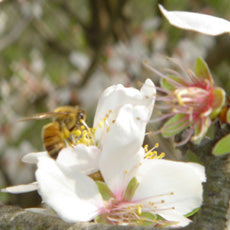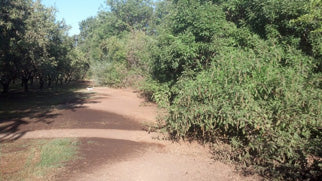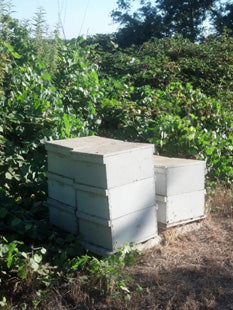Save Our Bees
Did you know that 70% of our food and plants depend on bees?
Here at Maisie Janes we care a lot about bees, because we need bees to grow almonds! Bee hives are brought to the orchards during bloom to assist with pollination since almonds are not self-pollinating.
The Problem
With bees being such an important part of the human, plant, and animal life, we must pay attention to them….and WE are…..more than ever because they are in danger! These complex and amazing invertebrates need our attention. The drastic decline in the honeybee colonies is no easy problem to solve. Their struggle for survival seems to be a very complex problem caused by a combination of stressors.
There are three known contributors to the struggle:
- More specifically the parasite, Varroa.
- The decline of forage sources for nutrition caused by habitat alteration and fragmentation.
- Additionally pesticide use and its effects on the bees.

The Solution
The solution is to take action! As there has been a growing initiative for both government and private organizations to make their contribution to helping Save the Bees in research to better understand the problem and finding solutions we still have a long ways to go. That is why MAISIE JANE’S CALIFORNIA SUNSHINE PRODUCTS, INC. is putting a lot of time and money in this cause.
Our Bee Friendly Farming Practices
We leave part of the orchards’ natural grasses in place rather than ‘chopping’ the entire vegetation. By doing this the green foliage will attract beneficial insects which decreases the invasive pests which harm the almond crop and the trees. This practice helps us to NOT have to spray harmful insecticides in the orchard. It also attracts bees by leaving the blooms in place in the native grasses and plants, which attracts the bee population.

There is a creek which serves as a border to the property of our organic almond orchard. We have planted native bushes and plants that attract the bees and create a safe forage area for them. We believe this also serves as a natural habitat to other beneficial insects and creates a healthier more balanced ecosystem.
The bee hives which we bring in to assist with the almond pollination, are local hives. They are not freighted across the country to arrive our farm. This means the carbon footprint is lessened but more importantly this is one factor that contributes to the health and vitality of the hives. It is believed that hives moved over long distance are more susceptible to disease and are weakened as colonies because of the stress of moving and the drastic change of their surroundings.
The simple fact that many of our almonds are grown organically, without pesticide and chemical exposure, preserves the bee population and all the wildlife in the vicinity and helps maintain the delicate and intimate relationship between our agricultural land and the natural surroundings. It truly is a beautiful marriage!
The Bee Research
We have partnered with the Xerces Society for Invertebrate Conservation who protects wildlife through the conservation of invertebrates and their habitat. For forty years, the Xerces Society has been at the forefront of invertebrate protection worldwide, harnessing the knowledge of scientists and the enthusiasm of citizens to implement conservation programs. Check out www.xerces.org.
Additionally Maisie Jane’s has partnered with The Harry H. Laidlaw Jr. Honey Bee Research Facility on Bee Biology Road, University of California, Davis. They are the largest and most comprehensive state‐supported agriculture facility in North America and the only one in California. They provide leading cutting‐edge research focusing on basic bee biology and genetics and international concerns about bee health, and meet the needs of California’s multibillion dollar agricultural industry. We have partnered using their resources in planting special flower mixes in our orchards that offer additional honey bee food in efforts to increase the native honey bee population in our orchards.
 What you can do to help:
What you can do to help:
- Support us, we’ll donate towards bee research! You can go to any Whole Foods market nation-wide, purchase any 12oz. jar of our delicious Almond butter, and we’ll donate $.05/jar towards bee research. The more we know, the better we can help the bees!
- Plant native plants in your own yard and garden. This will give the native honey bees the best bet for safe foraging areas and will give them good nutrition.
- Buy organic! The farming practices that are required to be a certified organic farm are more likely to be ‘bee friendly’ than conventional farms.
- Spread the Word! The more ‘buzz’ about the bee crisis, will raise the awareness and make people more responsible in their personal choices in their home gardens or landscape, as well as their political choices that could affect the future of bees.

 What you can do to help:
What you can do to help: